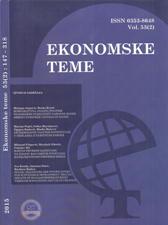Economic Themes (2015) 53 (2) 3, 185-210
Milorad Filipović, Miroljub Nikolić, Vojislav Ilić
Abstract: The most developed and most competit ive countries today (including the leading countries of the European Union) are so-called “knowledge-based economies”, where knowledge, information and highly sophis ticated skills play an important role in the development of the business and publ ic sector. Knowledge and technology are becoming ever more complex, participation in knowledge-based economic activities is significantly increased (high-tech production and knowledge-based services), and connecting companies in these areas with private and public institutions facilitates development and the successful application of new innovations, thus raising the level of competitiveness of companies, industries and the country as a whole. In the last few years, rapid growth in the international trade of high-tech products and knowledge- based services has significantly changed a large number of countries’ international competitiveness. These trends show that creating, implementing and commercializing new technology and knowledge facilitates the development of high-tech products and knowledge-based services, which have beco me an important source of increasing productivity and manufacturing and export competitiveness. Thus high-tech sectors have become an important source of high added value and well-paid jobs, plus sustainable economic growth and global competitiveness. According to the World Economic Forum’s competitiveness rankings, Se rbia is 95th out of 144 countries and is in the group of the 33 countries whose co mpetitiveness is efficiency-driven. The achieved level of competitiveness of the do mestic economy and the achieved level of economic development (Serbia is 75th in th e world for GDP per capita in dollars) points to low productivity in the use of available (human, capital, financial, etc.) resources accompanied by high current spending, which is not a situation that is sustainable in the long-term. The research starts from the assumption that the development of high-tech- and knowledge-based activities plays a significant role in strengthening the competitiveness of the ec onomy. A comparative analysis examines the link between the lagging Serbian econom y in terms of competitiveness and the slower development of a knowledge-based economy, compared to the most highly developed European countries and selected countries in the region. A structural analysis and comparison of the most important business indicators (employment, productivity and added value) of high technology and knowledge-based companies shows the development and basic characteri stics of the knowledge-based economy in Serbia and the macro-competitive position of Serbia compared to the leading and neighboring European Union countries. The paper also identifies the most important factors of developing a knowledge-based economy in Serbia, which needs to be improved to facilitate significant deve lopment of high-tech and knowledge-based activities as the basis for the future compet itiveness of the domestic economy. The final objective of the paper is to point out th e need for more substantial and faster development of a knowledge-based economy as a prerequisite for achieving long-term international competitiveness and sustain able development of the Serbian economy.
Keywords: knowledge-based economies; competitiveness; high-technology sectors
DEVELOPING A KNOWLEDGE-BASED ECONOMY AS A FACTOR TO RAISE THE COMPETITIVENESS OF THE SERBIAN ECONOMY
Milorad Filipović, Miroljub Nikolić, Vojislav Ilić
Abstract: The most developed and most competit ive countries today (including the leading countries of the European Union) are so-called “knowledge-based economies”, where knowledge, information and highly sophis ticated skills play an important role in the development of the business and publ ic sector. Knowledge and technology are becoming ever more complex, participation in knowledge-based economic activities is significantly increased (high-tech production and knowledge-based services), and connecting companies in these areas with private and public institutions facilitates development and the successful application of new innovations, thus raising the level of competitiveness of companies, industries and the country as a whole. In the last few years, rapid growth in the international trade of high-tech products and knowledge- based services has significantly changed a large number of countries’ international competitiveness. These trends show that creating, implementing and commercializing new technology and knowledge facilitates the development of high-tech products and knowledge-based services, which have beco me an important source of increasing productivity and manufacturing and export competitiveness. Thus high-tech sectors have become an important source of high added value and well-paid jobs, plus sustainable economic growth and global competitiveness. According to the World Economic Forum’s competitiveness rankings, Se rbia is 95th out of 144 countries and is in the group of the 33 countries whose co mpetitiveness is efficiency-driven. The achieved level of competitiveness of the do mestic economy and the achieved level of economic development (Serbia is 75th in th e world for GDP per capita in dollars) points to low productivity in the use of available (human, capital, financial, etc.) resources accompanied by high current spending, which is not a situation that is sustainable in the long-term. The research starts from the assumption that the development of high-tech- and knowledge-based activities plays a significant role in strengthening the competitiveness of the ec onomy. A comparative analysis examines the link between the lagging Serbian econom y in terms of competitiveness and the slower development of a knowledge-based economy, compared to the most highly developed European countries and selected countries in the region. A structural analysis and comparison of the most important business indicators (employment, productivity and added value) of high technology and knowledge-based companies shows the development and basic characteri stics of the knowledge-based economy in Serbia and the macro-competitive position of Serbia compared to the leading and neighboring European Union countries. The paper also identifies the most important factors of developing a knowledge-based economy in Serbia, which needs to be improved to facilitate significant deve lopment of high-tech and knowledge-based activities as the basis for the future compet itiveness of the domestic economy. The final objective of the paper is to point out th e need for more substantial and faster development of a knowledge-based economy as a prerequisite for achieving long-term international competitiveness and sustain able development of the Serbian economy.
Keywords: knowledge-based economies; competitiveness; high-technology sectors

